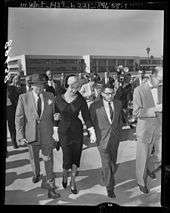Sidney Skolsky
| Sidney Skolsky | |
|---|---|
.jpg) Sidney Skolsky as himself in The Corpse Came C.O.D. (1947) | |
| Born |
Sidney Skolsky May 2, 1902 New York, New York, U.S. |
| Died |
May 3, 1983 (aged 81) Los Angeles, California, U.S. |
| Occupation |
Gossip columnist Screenwriter Movie actor Movie producer Radio personality |
| Nationality | American |
| Spouse |
Estelle Lorenz (1928-1983; his death) |
| Children |
Nina Skolsky Steffi Skolsky |
Sidney Skolsky (2 May 1905 – 3 May 1983) was an American writer best known as a Hollywood gossip columnist. He ranked with Hedda Hopper (with whom he shared a birthday) and Louella Parsons as the premier Hollywood gossip columnists of the first three decades of the sound picture era. A radio personality in addition to having his own syndicated newspaper column, Skolsky also was a screenwriter and movie producer who occasionally acted in the radio and in the movies. Skolsky claimed to be the person who gave the nickname "Oscar" to the Academy Award[1] and was credited for the introduction of the use of the word beefcake.[2]
Biography
Skolsky was born to dry goods store proprietor Louis Skolsky and his wife Mildred in New York City. He studied journalism at New York University before becoming a Broadway press agent for the theatrical impresarios Earl Carroll, Sam Harris, and George White. When he became the New York Daily News gossip columnist in 1929, the 23-year-old Skolsky was the youngest Broadway gossip columnist plying his trade on the Great White Way. He also had a Sunday column, "Tintypes", profiles of actors, directors and other production personnel and Hollywood creative types, that continued in print for 52 years, until a couple years before his death.[1]
He moved to Hollywood in 1933, where he moonlighted as a story editor for Darryl F. Zanuck's Twentieth Century Pictures. The New York Daily Mirror hired him away from the Daily News in 1937, and he eventually worked for the New York Post. United Features syndicated his column to other newspapers. He also had a regular column in Photoplay, the country's premiere movie magazine. His Photoplay column was bylined "From A Stool At Schwab’s", the Hollywood drugstore he made famous.[1] He helped promulgate the myth Lana Turner had been discovered there, when actually, it had been another Sunset Boulevard establishment, The Tophat Cafe, which was closer to Lana's alma mater, Hollywood High.[3] He helped champion and was very close to Marilyn Monroe.[4]

While Skolsky might not have created the nickname "Oscar" for the Academy Award, he is the first person to use the nickname in print for Hollywood's premier award, in his 16 March 1934 column.[5] In 1946, he became a movie producer with The Jolson Story (1946), which was nominated for a Best Picture Oscar. He followed it up with 1953 bio The Eddie Cantor Story. Starting in 1954, KABC-TV Los Angeles featured him in his own TV show, Sidney Skolsky’s Hollywood. He wrote five books about Hollywood and the movies, including a 1975 autobiography, Don’t Get Me Wrong, I Love Hollywood.[1]
Skolsky died in 1983 from complications due to Parkinson's disease and atherosclerosis. He was married to the former Estelle Lorenz, with whom he had had two daughters, for 54 years.[1] His writings are part of the permanent collection at the Academy of Motion Picture Arts and Sciences' Margaret Herrick Library.[6]
References
- 1 2 3 4 5 "Sidney Skolsky". Find a Grave. Retrieved 23 September 2013.
- ↑ p.120 Hofler, Robert The Man Who Invested Rock Hudson Carroll and Graf 2005
- ↑ Wilkerson, W.R. 3rd (1 July 1995). "Writing the End to a True-to-Life Cinderella Story : Remembrance: The facts of Lana Turner's discovery at a soda fountain have changed through the years, but the legend remains.". Los Angeles Times. Retrieved 24 September 2013.
- ↑ "Daughter of Famed Hollywood Columnist Sidney Skolsky Passes". Marilyn Monroe Collection Blog. Retrieved 23 September 2013.
|first1=missing|last1=in Authors list (help) - ↑ "The 6th Academy Awards (1934)". Academy of Motion Picture Arts & Sciences. Retrieved 23 September 2013.
- ↑ "Sidney Skolsky Papers". Academy of Motion Picture Arts & Sciences.
| Wikimedia Commons has media related to Sidney Skolsky. |